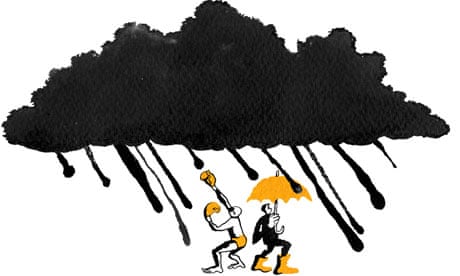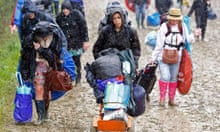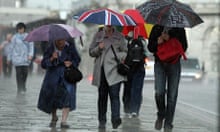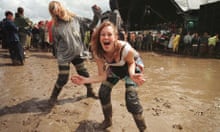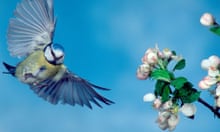Everyone bewildered by the seemingly unprecedented weirdness of this year's summer might spare a thought for those living in 1783, who went through another kind of trial by weather. Gilbert White of Selborne's account of the events of 23 June to 20 July is a masterpiece of deadpan gothic: "The sun, at noon, looked as blank as a clouded moon, and shed a rust coloured ferruginous light on the ground … but was lurid and blood-coloured at rising and setting. All the time the heat was so intense that the butcher's meat could hardly be eaten on the day after it was killed."
White didn't know this phenomenon was caused by a volcanic eruption in Iceland, and regarded it as just an extreme example of the British weather's intrinsic capriciousness. His daily journal shows that 1783 had already been depressingly awful. Immense rains in January, deep snow into May, cold north winds throughout the spring. The year before had been just as dismal.
Sounds familiar? A browse through centuries of graphic weather description in English writing gives a different – and oddly reassuring – perspective on the soul-sapping bleakness of the past three years. Which makes me wonder if there is an undeclared motive behind the Met Office's unprecedented decision to hold a crisis meeting this week to discuss the UK's "disappointing" recent weather. We don't need any hints about the agenda: 2013 had the coolest spring for 50 years, 2012 was the wettest year "since records began", the cold winter of 2010-11 (the paralysing snowdrifts of 1979 and 1982 having, it seems, already been forgotten) is regarded as "exceptional". Jet stream shifts and Arctic ice-melt will be on the agenda, which will focus on whether we are experiencing just a short-term blip, a longer-term natural trend, or a sinister early fallout from global warming.
It will doubtless be a fascinating academic debate, but won't – indeed can't – come to any firm conclusions, given that it is concerned with such a short period. (A "trend" is defined as a consistent shift over 30 years.) Perhaps the Met Office hopes it may point a way towards better forecasting. I think the meteorological business is at last acknowledging how deeply it is involved in our cultural experience of the weather. Our national preoccupation has made the forecast part of the weather, and the forecasters have come to be regarded as oracles, not just sources of practical guidance but scapegoats when things go wrong. Sensing our heightened concerns, they may this week be undertaking a risky reading of the runes.
If so, I fear the outcome will be evasive, depressing, and miss the point of what is needed. If there is long-term change afoot in our weather, it matters not a jot to the quality of our lives whether it is part of an entirely natural cycle or a consequence of global warming. (We're way past the point where anything short of a massive programme of carbon capture could halt the latter for the next half century.) We need to learn to adapt to what is happening. This has always been especially difficult for the British.
Because we live on an island in the Atlantic storm belt, just offshore from a huge continental land mass, our meteorological lot has always been messy and erratic. We can't acclimatise, culturally or psychologically, can't reconcile ourselves to these repeated bolts from the blue. We take refuge in false memories of perpetual golden summers, and regard what, on any objective scale, would be trivial weather nuisances, as dashers of hopes and ruiners of our sense of the proper order of things.
Is it beyond the bounds of possibility that we could find ways of positively enjoying grim weather – of, in the language of cognitive behaviour therapy, "reconfiguring" it? I think there are signs we could. This week the Aldeburgh Festival has been staging Britten's opera Peter Grimes on the shoreline, where it belongs, with a stiff north-easterly blowing salt on to the lips of the audience. Next week it's Glastonbury, where rain and mud are on the cast-list of star attractions, and which has turned the wellington boot into a fashion item. Maybe we'll see a reprise of Dorothy and William Wordsworth's (early adapters) habit of going round snuggled together in a vast single topcoat.
Up here in East Anglia, on the front line of sea-level rise, the first houses on stilts are being built, reviving a common tradition of the flood-prone middle ages. If only the local farmers (already pleading for support) could get beyond their paralysed dependence on monocultures, we'd be moving in the right direction. (Any Mexican smallholder, sowing a dozen varieties of corn to cope with any contingency, would be derisory of agribusinesses' reflex of entrusting all its seeds to one genetic basket.)
Evolution itself, a long, successful negotiation with changeable climates, depends on diversity and quick-footed inventiveness. We need to get in line. At the moment it's as if, T-shirted at the umpteenth climate change rally, we've looked up and, good gracious, the weather has changed, and we'd clean forgotten our mum's advice to always take an extra layer.
